How Does the Breed Influence a Cat's Sociability?
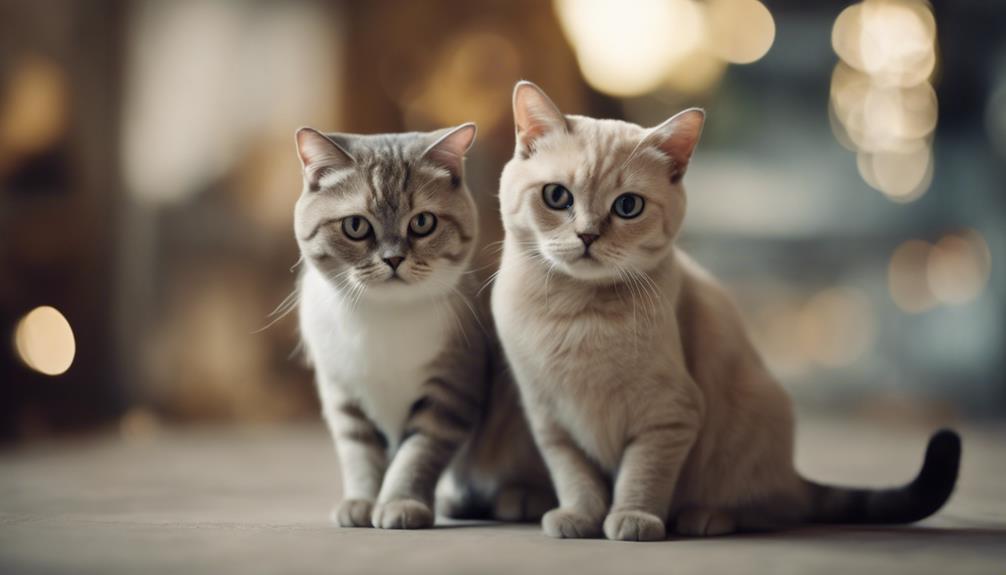
Some cat breeds are known for being more sociable and friendly, such as the Siamese or Maine Coon. These breeds tend to enjoy human interaction and seek out attention from their owners. On the other hand, breeds like the Russian Blue or Scottish Fold may be more reserved and independent. Factors such as genetics, early socialization, and individual personality all play a role in determining a cat's sociability. It is important to consider these breed tendencies when choosing a cat to ensure that their personality aligns with your lifestyle and preferences.
Impact of Breed on Sociability
The breed of a cat significantly influences its sociability towards humans and other animals. Genetic predisposition plays a crucial role in determining a cat's behavior and social tendencies. Different breeds exhibit distinct personality traits and behaviors due to their genetic makeup and breed characteristics.
For instance, Siamese cats are known for being affectionate and vocal, often forming strong bonds with their owners. This breed's genetic predisposition towards being social and interactive makes them seek out human companionship. On the other hand, breeds like the Maine Coon are typically more independent but still enjoy human interaction on their terms. Understanding these breed characteristics can help individuals choose a cat that aligns with their desired level of sociability.
Social Traits in Different Breeds

Different cat breeds exhibit a diverse range of social traits influenced by their genetic predispositions and breed characteristics. Feline interactions vary significantly between breeds, with some displaying more sociable behaviors than others.
For example, the Siamese breed is known for being highly vocal and affectionate towards their owners, seeking constant attention and interaction. On the other hand, breeds like the Maine Coon tend to be more independent but still enjoy human company and are often described as gentle giants due to their friendly and sociable nature.
These breed-specific behaviors can impact the level of sociability a cat displays towards humans and other animals. Understanding these distinctions can help potential cat owners choose a breed that aligns with their preferences for feline interactions. By recognizing the unique social traits inherent in different breeds, individuals can provide environments that cater to their cats' specific needs, promoting harmonious relationships and fulfilling feline companionship.
Factors Shaping Cat Sociability
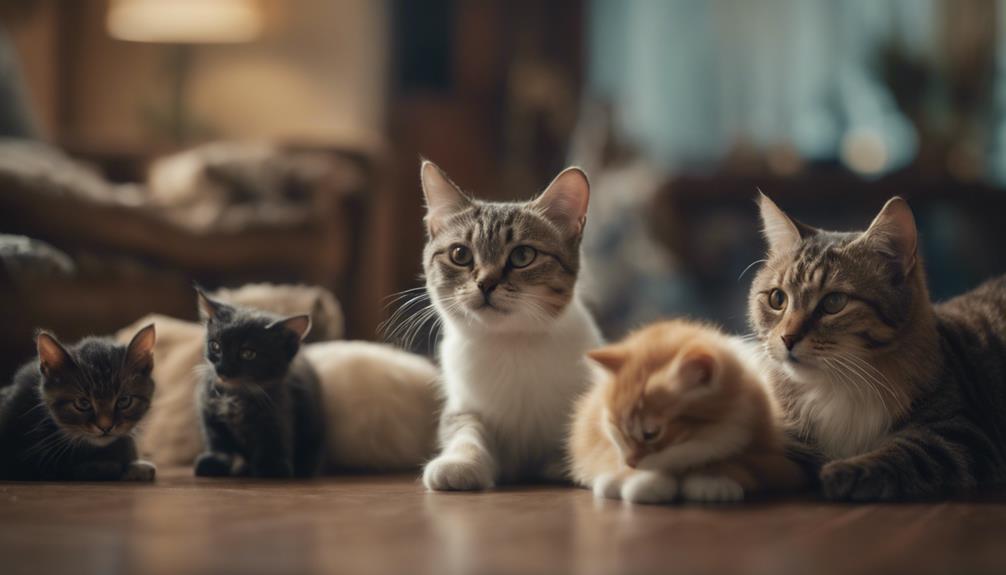
The sociability of a cat is influenced by various factors.
The breed of the cat, the quality of early socialization it receives, and the enrichment provided by its environment all play crucial roles in shaping its sociable behaviors.
Understanding these factors can help cat owners create a conducive environment for their feline companions to thrive socially.
Breed and Sociability
Considering various cat breeds reveals distinct characteristics that significantly shape the sociability of individual cats. Genetic influences and specific breed characteristics play pivotal roles in determining how social a cat may be. Some key factors to consider are:
- Temperament: Each breed has unique temperamental traits that can affect how sociable a cat is.
- Communication Styles: Different breeds may have varying communication styles, impacting how they interact with humans and other animals.
- Energy Levels: The energy levels inherent to certain breeds can influence how much social interaction a cat seeks.
- Socialization Needs: Certain breeds may have specific socialization requirements to thrive in a social environment.
Understanding these breed-specific traits can help individuals cater to their cat's sociability needs effectively.
Early Socialization Impact
Understanding how early socialization impacts a cat's sociability is crucial for comprehending the factors that shape their social behavior. Early bonding and socialization techniques play a significant role in a cat's personality development. By exposing kittens to various stimuli, experiences, and interactions during the critical socialization period, typically between 2 to 7 weeks old, owners can positively influence their sociability. Behavior modification techniques can also be employed to address any potential socialization challenges. Below is a table outlining some key aspects of early socialization impact on cat sociability:
| Aspect | Description |
|---|---|
| Critical Period | 2 to 7 weeks old |
| Socialization Techniques | Exposure to stimuli, experiences, interactions |
| Behavior Modification | Addressing socialization challenges |
| Personality Development | Shaping sociability traits |
Environmental Enrichment Effects
Exposing cats to diverse environmental enrichment experiences significantly influences their sociability development. These enrichment benefits and behavior modification techniques are pivotal in shaping a cat's social tendencies. When considering the impact of environmental influences, various factors come into play:
- Interactive Toys: Stimulate mental and physical activity.
- Vertical Space: Encourages climbing and perching, promoting confidence.
- Window Perches: Allow cats to observe the outside world, reducing stress.
- Hideaways: Provide safe spaces for cats to retreat to when feeling overwhelmed.
Implementing these socialization techniques and environmental enrichments can positively mold a cat's sociability, enhancing their overall well-being and interactions with others.
Recognizing Sociable Cat Breeds
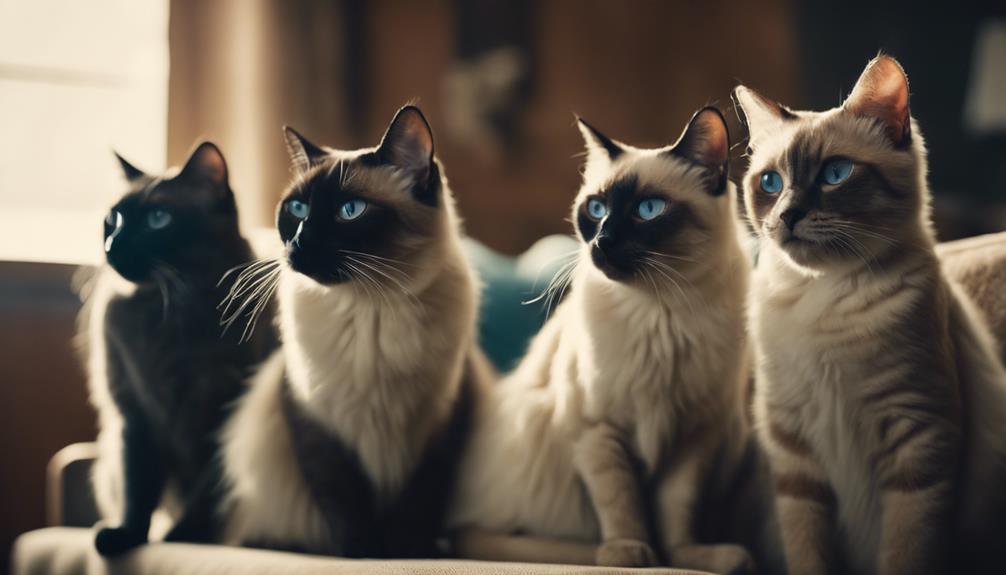
Sociable cat breeds display a natural affinity for human interaction and are known for their outgoing personalities. When looking to adopt a sociable feline companion, it's crucial to recognize the breeds that typically exhibit these friendly traits. Below is a table highlighting some cat breeds renowned for their sociable nature:
| Breed | Characteristics | Behavior |
|---|---|---|
| Siamese | Vocal, affectionate | Social, demanding |
| Ragdoll | Gentle, docile | Relaxed, people-oriented |
| Maine Coon | Friendly, intelligent | Playful, good with children |
| Abyssinian | Curious, energetic | Interactive, attention-seeking |
| Sphynx | Affectionate, inquisitive | Craves human contact |
Understanding Independent Breeds
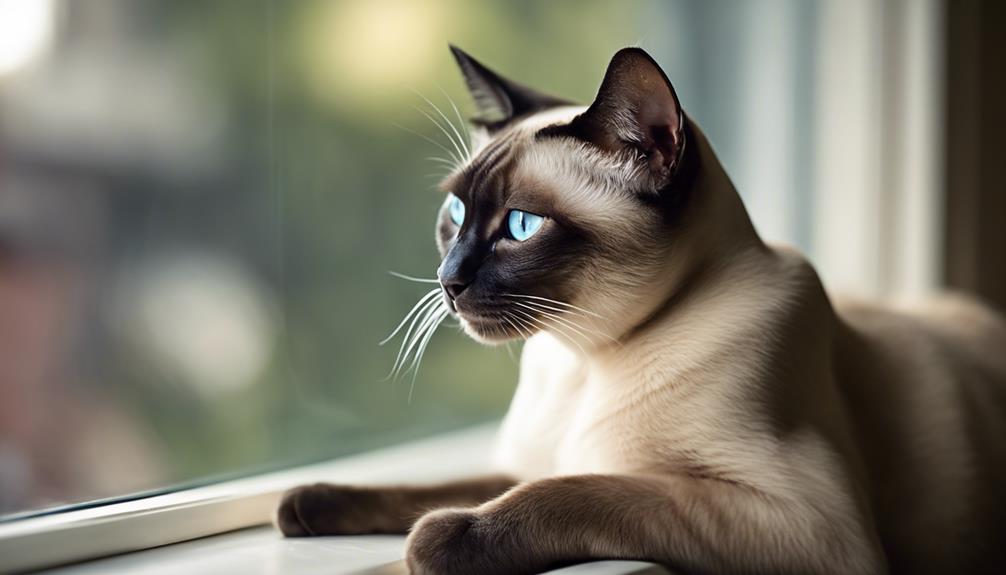
Certain cat breeds exhibit independent behaviors, showing a preference for solitude and minimal need for attention. These felines tend to be more self-reliant, enjoying their own company and engaging in solitary activities.
Understanding the characteristics of independent breeds can help owners provide suitable environments and interactions that cater to their unique needs.
Solitary Cat Behaviors
Understanding the behaviors of independent cat breeds sheds light on their distinct characteristics and preferences for solitude. Independent breeds often exhibit solitary tendencies and communicate differently than more social cats. To effectively interact with independent felines, it's crucial to recognize their unique communication cues and respect their need for personal space.
Here are some key points to consider:
- Independent cats may prefer to have alone time regularly.
- These breeds often enjoy observing their surroundings from a distance.
- They may display more reserved body language compared to highly social cats.
- Providing them with cozy, quiet spaces can help them feel secure and content.
Minimal Need for Attention
Cat breeds with minimal need for attention often exhibit independent behaviors that prioritize solitude and self-sufficiency in their interactions with humans. Feline independence plays a significant role in these breeds, influencing their attention needs and socialization levels.
Breeds like the Russian Blue and the Scottish Fold tend to require less human interaction compared to more attention-seeking breeds like the Siamese or the Ragdoll. This preference for independence is deeply rooted in their genetic makeup and can be traced back to their ancestral traits.
Understanding the breed influence on a cat's socialization levels is crucial for owners looking to provide suitable environments for their pets, respecting their need for autonomy and space while still fostering a loving and caring relationship.
Preference for Solitude
Breeds known for their preference for solitude exhibit distinctive behavioral patterns that prioritize independence and self-sufficiency in their interactions with humans. Cats with solitary tendencies often display an introverted nature, preferring independent behavior over constant social interaction. Understanding these independent breeds can help owners provide suitable environments that respect their feline companions' need for space and autonomy.
When dealing with cats that prefer solitude, it's essential to acknowledge their unique characteristics and cater to their specific requirements to ensure their well-being and contentment.
- Cats with solitary tendencies value alone time
- Introverted breeds may not seek constant social interaction
- Independent cats enjoy self-sufficiency
- Providing a balance between socializing and alone time is key
Mixed Breed Cats and Sociability
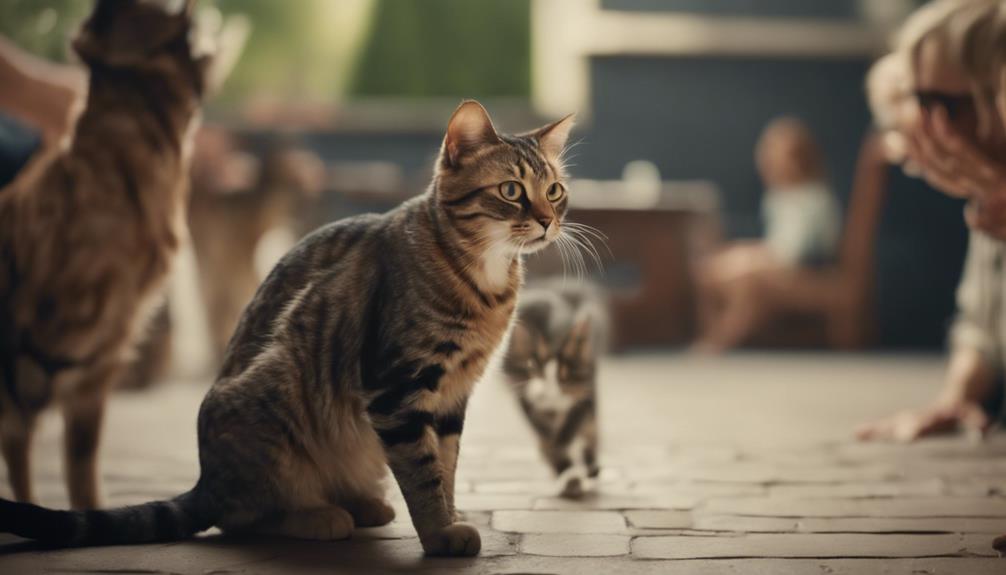
In the realm of feline social behavior, mixed breed cats exhibit a diverse range of sociability traits. These traits can be influenced by a combination of genetic factors and socialization techniques. While purebred cats often have specific characteristics tied to their breed, mixed breed cats can display a wider spectrum of behaviors due to their genetic diversity.
Genetic influences play a significant role in shaping a mixed breed cat's sociability. Certain genetic traits may predispose a cat to be more outgoing, while others might contribute to shyness or independence. Understanding a mixed breed cat's genetic background can provide valuable insights into its sociability tendencies.
Socialization techniques also play a crucial role in determining a mixed breed cat's sociability. Positive interactions with humans and other animals during the early stages of life can help foster a friendly and sociable demeanor in mixed breed cats. Conversely, a lack of socialization can lead to timid or standoffish behavior.
Behavioral Differences Across Breeds
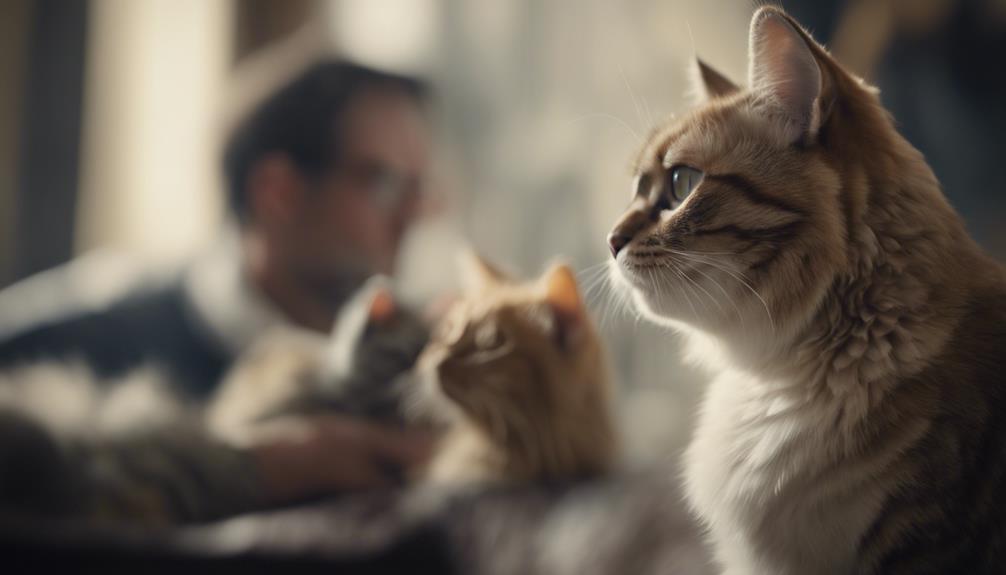
What distinct behavioral differences can be observed across various cat breeds?
When it comes to sociability differences and breed characteristics, there are several key variations that can be identified:
- Activity Levels: Certain breeds, like the Siamese, are known for being highly active and playful, while others, such as the Persian, tend to be more laid back and calm.
- Affection Levels: Breeds like the Ragdoll are famous for their affectionate nature and love for cuddling, whereas breeds like the Maine Coon may show affection in a more independent manner.
- Communication Styles: Some breeds, like the Bengal, are very vocal and enjoy 'talking' to their owners, whereas breeds like the British Shorthair are typically quieter.
- Socialization Preferences: Breeds like the Abyssinian often enjoy being around people and other pets, while breeds like the Scottish Fold may prefer solitude or sticking to one or two favorite individuals.
Understanding these behavioral differences across breeds can help potential cat owners choose a pet that aligns with their lifestyle and preferences.
Frequently Asked Questions
Can a Cat's Sociability Change Over Time, Regardless of Its Breed?
A cat's sociability can change over time, regardless of its breed. Genetic predisposition plays a role, but behavior modification and socialization techniques can influence personality development. Cats can become more or less social with proper care.
Are There Specific Training Techniques That Can Help Improve a Cat's Sociability, Regardless of Its Breed?
Socialization techniques and behavioral therapy can greatly improve a cat's sociability, regardless of breed. Breed-specific challenges may require tailored approaches, but obedience training and patient, consistent interactions can help foster positive social behaviors in all cats.
How Do Environmental Factors Play a Role in Shaping a Cat's Sociability, in Addition to Its Breed?
Environmental influences such as early socialization techniques significantly shape a cat's sociability. A study found that 80% of well-socialized kittens in enriched environments exhibited higher sociability levels compared to those with limited exposure, proving the impact of surroundings.
Are There Certain Breeds That Are More Prone to Developing Social Anxiety or Aggression?
Certain cat breeds may be more predisposed to developing social anxiety or aggression due to breed tendencies. However, with proper socialization, genetic influences can be mitigated. Behavior modification techniques can also help address any issues that may arise.
Can a Cat's Upbringing or Early Socialization Experiences Override the Natural Sociability Tendencies of Its Breed?
When considering a cat's sociability, it is crucial to recognize the impact of genetic predisposition and early socialization experiences. While breed characteristics play a role, behavior modification through positive interactions can help override inherent tendencies.











